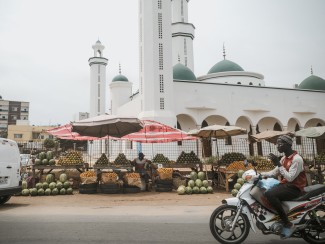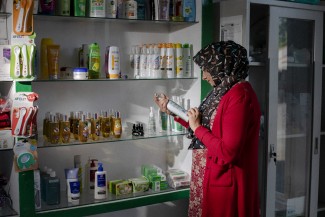KEY RESULTS
- In Mauritania, the Enhanced Integrated Framework (EIF) supported the mainstreaming of trade in the National Development Plan and the development of sector strategies integrating trade for the industry, tourism, agriculture, and handicraft sectors.
- The staff in the EIF-established National Implementation Unit (NIU) have led trade development projects, including on capacity-building in the tourism sector. The NIU has also supported the signing of regional trade agreements, including related to the African Continental Free Trade Area (AfCFTA).
- Through the EIF-supported eco-tourism project, three eco-tourist campsites have been constructed, which are helping local communities to maximize the economic and ecological opportunities in their area. The project has benefitted more than 200 women who acquired new skills, resulting in poverty alleviation and a slowing of rural-urban migration. For the first time, rural women are actively involved in the planning, development, and implementation of projects in their community.
- The EIF supported the training of 500 young people in various hotel services, who then actively participated in organizing the 2018 African Union Summit of Heads of State, providing them with an opportunity to significantly enhance their skills. Most are now employed in the country’s hotel industry.
With an estimated population of 4.1 million in 2017 and a surface area of 1,030,000 km2, the Republic of Mauritania is a Saharan-Sahelian country. It serves as the bridge between the Arab Maghreb and western sub-Saharan Africa. Although it is endowed in minerals such as iron and gold, with fishing being another large contributor to the economy, Mauritania’s people survive on food imports. Of the country’s predominantly urban population, 44% live in extreme poverty, with the majority surviving on around USD 2 a day.
Over many years, Mauritania implemented various strategies to transform and liberalize its economy. However, these efforts failed to yield the desired outcomes of driving a thriving and diversified economy. A World Trade Organization review of Mauritania’s trade policies and practices in 2022 concluded that "Mauritania needs international support and a coherent programme of integrated technical assistance for a more effective participation in the multilateral trading system and to reap the benefits of the liberalization efforts."
Mauritania was one of three pilot countries, alongside Cambodia and Madagascar, chosen by the Integrated Framework (IF) to conduct a Diagnostic Trade Integration Study (DTIS). This study, initiated in 2001 with technical support from the World Bank, was an important first step in understanding barriers to economic growth, especially barriers to trade, and highlighted areas of investment with potential to boost the economy. The Poverty Reduction Strategy Paper, published two years later in 2003, drew heavily on the recommendations of the DTIS.
The EIF supported the DTIS Update in 2015, which was focused on exploring the potential of key economic sectors including transport, livestock, trade, agriculture, and commerce. The study recommended the diversification of Mauritania’s economy to cushion it from shocks in the petroleum, gas, and iron markets. The priority actions identified in the DTIS greatly informed trade priorities in the 2016-2030 National Development Plan (NDP) and the National Strategy for Accelerated Growth and Shared Prosperity (SCAPP) 2016-2030, which focuses on more diversified growth and is devoted to promoting economic diversification and transformation.
The strategy aims to fully exploit the economy’s growth potential and reduce its vulnerability to exogenous shocks linked to the volatility of raw material prices and climate change. This has led to trade being strategically positioned under the plan’s first strategic pillar, entitled: "Promoting strong, sustainable and inclusive growth". Considering their close connection to trade, the EIF programme also supported the integration of different sectors in the NDP by contributing to the development of sector strategy integration reports for the industry, tourism, and agriculture sectors.
Building institutional capacity to support trade
Since 2017, the EIF has focused on measures to support institutional capacity to integrate Mauritania into global trade. This has included improving coordination among agencies related to trade policy; mainstreaming trade into development strategies; implementing DTIS priorities; and strengthening dialogue and coordination between development partners through a National Trade Facilitation Committee. To deepen the economic reforms being undertaken by the Government of Mauritania, more than 780 public, private, and civil society officials were trained, with 68% of these being women.
Mohamed Lemine Vayda, Director of Foreign Trade Promotion in the Ministry of Trade, Industry, Crafts and Tourism in Mauritania, highlighted the value of the EIF in helping to build capacity. This has empowered government officials to effectively operate in regional institutions and systems to facilitate trade growth:
Bold steps to boost tourism
The tourism sector in Mauritania holds enormous potential for job creation and other economic benefits, especially for women with limited opportunities. Tourism has been identified as a priority in the DTIS Update, particularly ecotourism. The EIF-supported ecotourism development project in the protected Banc d’Arguin National Park (PNBA), a World Heritage Site spanning 12 000 km along the Atlantic coast, is offering income-generating opportunities for local women by directly supporting women's cooperatives while preserving the environment. The park provides magnificent landscapes formed from the combination of desert sand dunes, low coastal swamps, and small islands, which until now have remained largely unexplored and underdeveloped. The swamps offer a conducive environment for millions of migratory birds, such as flamingos and pelicans.
The eight villages around the national park receive seasonal tourists, especially from Europe, but a lack of accommodation limits the full potential of the tourist season. An investment of USD 1.5 million from the EIF and about USD 246 000 from the Government of Mauritania is driving economic expansion in the area. Ecolodges have been built using environmentally friendly materials in three of the eight villages (Iwik, Mamghar and Tessot); the other five villages still receive day visitors. The tourist camps come with modern tents for accommodation, sanitation facilities and transportation.
Hadramy Ould Ahmed Deida, Head of the Cooperation Department of PNBA, believes that with these improved facilities, the camps will attract a growing number of domestic and international tourists:
Most importantly, the construction of ecolodges, while generating much-needed income for local communities to alleviate poverty, has also contributed to preserving the heritage and biodiversity of PNBA and combating any further environmental degradation that might result from the tourism activities.
The ecotourism project has been especially beneficial to women’s cooperatives. Participant women’s lives have been transformed, as they are earning income to improve the living conditions of their families. About 190 were trained in handicraft production, while another 70 received training in sustainable tourism practices. These newly acquired skills are enabling women to diversify and increase their income streams. According to Hamza Babetta, Secretary-General of the Fédération Mauritanienne de Tourisme, which represents the private sector:
The ecotourism lodges and ancillary activities, such as fishing, making handicrafts using fish bones, and market gardening, are the primary sources of income for the women. These economic activities have also slowed rural-urban migration, which is widespread in Mauritania.
Community-driven awareness-raising campaigns to protect the environment are also underway, and the project has set a firm foundation for maximizing the economic and ecological values of such ecotourism activities. Deida added that the tourism project aligns with the country’s tourism strategy: "The training provided in cooking and welcoming tourists, as well as the construction of the ecolodges, are perfectly in line with the needs expressed in our ecotourism strategy. So, the project meets our expectations. For the moment, we’re only at the beginning, but we’re sure it will have an impact. There has already been a big improvement on what the women were offering tourists before the project. All revenue generated will be redistributed to approximately 200 women in the cooperatives".
Meanwhile, the NIU supported the training of 500 young people in various hotel services. This youth empowerment initiative responds to recommendations from the country’s national development strategy to strengthen the professional and personal skills of young people, who account for about 60% of the country's population. Leveraging their newly acquired skills in hotel services, many of these young individuals actively assisted with the logistical aspects, particularly in accommodation services, during the 2018 African Union Summit of Heads of State, held in the capital Nouakchott. According to Vayda, many have since been absorbed into the country’s hotel industry.
Strengthening partnerships and leveraging resources to benefit local communities
Partnerships between the Ministry of Trade and Tourism, the PNBA, the NIU, and the EIF are bolstering efforts to preserve the environment. An awareness-raising campaign to mobilize local communities to clean up the coastline where tourism sites are located is yielding positive results. Plans are also underway to establish a waste collection centre, with a Spanish development partner identified to help with the development of this facility. Women are now more vigilant in participating in the regulation of fishing activities, to protect their ventures and prevent the depletion of fish resources.
The NIU has demonstrated its ability to coordinate the Government of Mauritania’s development initiatives, as well as Aid for Trade projects jointly implemented with other development partners. The USD 300,000 project with the Aid for Trade Initiative for the Arab States (AFTIAS) on "Improving the competitiveness of textile dyeing in Mauritania" provides an example of how the NIU is leveraging resources from different partners to support government-supported partnerships.
According to Mohammed Hitt, NIU Coordinator, the EIF has been instrumental in facilitating Mauritania’s involvement in the AFTIAS programme, which saw women being supported in textile dyeing activities. Hitt added "An EIF project was implemented in Mauritania, responding directly to the needs of beneficiaries. The real achievement is the ability to provide people with things that meet their needs."
_ _ _
As the second phase of the Enhanced Integrated Framework (EIF) comes to an end in 2024, the objective is to produce a catalogue of impact stories showcasing the efforts of the EIF partnership in the least developed countries (LDCs) and recently graduated LDCs where it has been actively engaged. This impact story makes up one of the stories in the catalogue. Essential input and reviews were received from the country‑based EIF National Implementation Units (NIUs) and the wider EIF team.
The primary objective of each impact story, as well as the entire catalogue, is to adopt a journalistic approach in recounting the EIF's engagement in the LDCs during both Phase One and Two. The aim is to offer valuable insights and to document outcomes and impacts, as well as some lessons learned from the work of the EIF partnership in the LDCs. These stories do not provide a comprehensive overview of every aspect of EIF partnership engagement such as precise timelines or the exact extent of involvement (i.e., financial contributions). Instead, they serve as one of several means of information about the work of the EIF partnership. Interested readers are encouraged to supplement these impact stories by consulting other sources, including EIF Annual Reports, Trade for Development News articles, EIF social media channels, and, where applicable, the NIUs in the LDCs as well as the EIF Executive Secretariat.
It is essential to acknowledge that the information provided is neither exhaustive (e.g., it is based on the latest available data at the time of writing in 2023) nor evaluative in nature.
Lastly, while each impact story adheres to a similar structure, the diverse range of countries, contexts, and EIF engagements means that each story is unique.
If you would like to reuse any material published here, please let us know by sending an email to EIF Communications: eifcommunications@wto.org.



